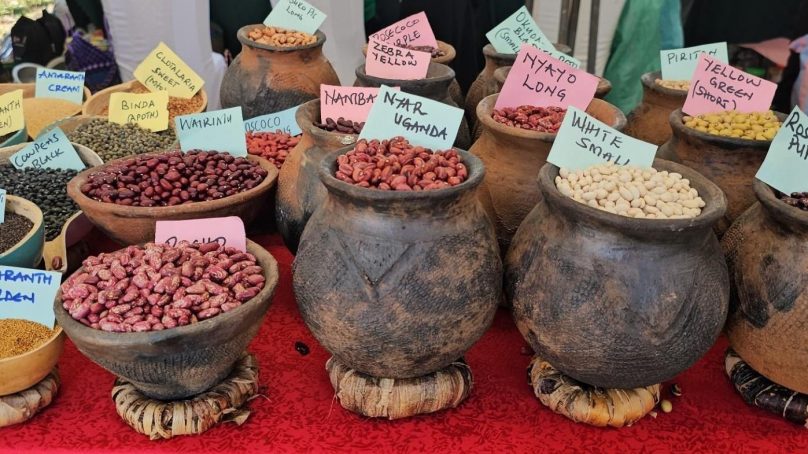
The 4th Indigenous Seed and Food Harvest Fair is scheduled for October 14-15 this year at the in Laikipia County Governor’s Grounds to celebrate Kenya’s rich heritage of indigenous seeds, traditional foods and culture.
This year’s event themed: Collaborating to Nurture Indigenous Seeds and Foods for a Better Future, focuses on enhancing collaboration between different stakeholders to promote access and utilization of indigenous seeds and foods for better foods and future.
The Seed Fair provides a unique and dynamic platform to educate stakeholders on the need for conservation of indigenous seeds and appraise the efforts made, while highlighting the outstanding challenges facing the sector.
The event is organised by the Inter-Sectoral Forum on Agrobiodiversity and Agroecology (ISFAA) in partnership with the Laikipia County government, the Ministry of Agriculture and Livestock Development and other stakeholders.
The 2025 edition will feature exhibitions of indigenous seeds, plants and livestock, as well as workshops, presentations, keynote addresses, plenary discussions and an award ceremony.
Participants will include farmers and stakeholders from Kenya’s diverse agro-ecological zones and beyond.
The event aligns with the 2025 World Food Day theme: Hand in Hand for Better Foods and a Better Future, highlighting the vital role of seeds in ensuring food security, nutrition and climate resilience.
In Kenya, Farmer Managed Seed Systems (FMSS) provide 80-100 per cent of seeds for smallholder farmers, who are responsible for about 70 per cent of agricultural production and 75 per cent of national food supply.
FMSS supports seed saving, sharing, and exchange of cultural practices deeply rooted in Kenyan communities. These rights are backed by Article 9 of the International Treaty on Plant Genetic Resources for Food and Agriculture, and by Article 11(3) (b) of Kenya’s Constitution, which mandates the protection of indigenous seeds and traditional knowledge.
However, several challenges persist including the Seeds and Plant Varieties Act (2012), which still restricts the exchange or sale of uncertified indigenous seeds, limited government support and data on indigenous seed systems, inadequate funding and recognition for community seed banks and low public awareness on the value of indigenous seeds and related policy issues, among others.
ISFAA Coordinator Martin Oulu says indigenous seeds, handed down through generations, are specifically suited to thrive in local environments. Compared to commercial seeds, indigenous are more resistant to harsh weather, pests and diseases, making them especially valuable in the face of climate change and growing uncertainty in agriculture.
Dr Oulu said that protecting these traditional seeds helps communities maintain biodiversity and secure their food rights. Recognition of the role played by community seed banks is key to sustainable and resilient food systems, including the conservation of plant genetic resources, provision of nutritious and diverse diets, climate adaptation and resilience
“Community-based seed systems and seed banks give farmers the ability to preserve and manage their own crop varieties,” he said.
He observed that this access to a wide range of nutritious crops not only supports a reliable food supply, but also enhances the community’s ability to recover from environmental or economic disruptions.
Oulu stated that the annual seed fairs began in 2022 with the previous one held in Kisumu County at the Nyando community seedbank in a push to realise the potential of indigenous seeds and foods, contribution to a better future, which requires collaborations, partnerships, and working together.
He observed that past Seed fairs have sparked positive developments including a review of the Seed Policy 2010, ongoing consultations on the Seeds and Plant Varieties (Conservation, Access and Benefit Sharing) Regulations 2024, establishment of new community seed banks and increased participation of women and youth in seed conservation.
“This year’s seed fair is particularly significant since it marks the beginning of the review of the Seeds and Plant Varieties Act (2012), which ISFAA and other partners have for long advocated for its review, as it currently does not recognize and protect indigenous seeds and Farmer Managed Seed Systems (FMSS)” he said.
He said that ISFAA and other stakeholders invites participation from youth, farmers, media, policymakers, civil society, the private sector, community members and consumer organizations to collectively advocate for sustainable, inclusive and resilient food systems.
- A Tell Media / KNA report / By Anita Omwenga








